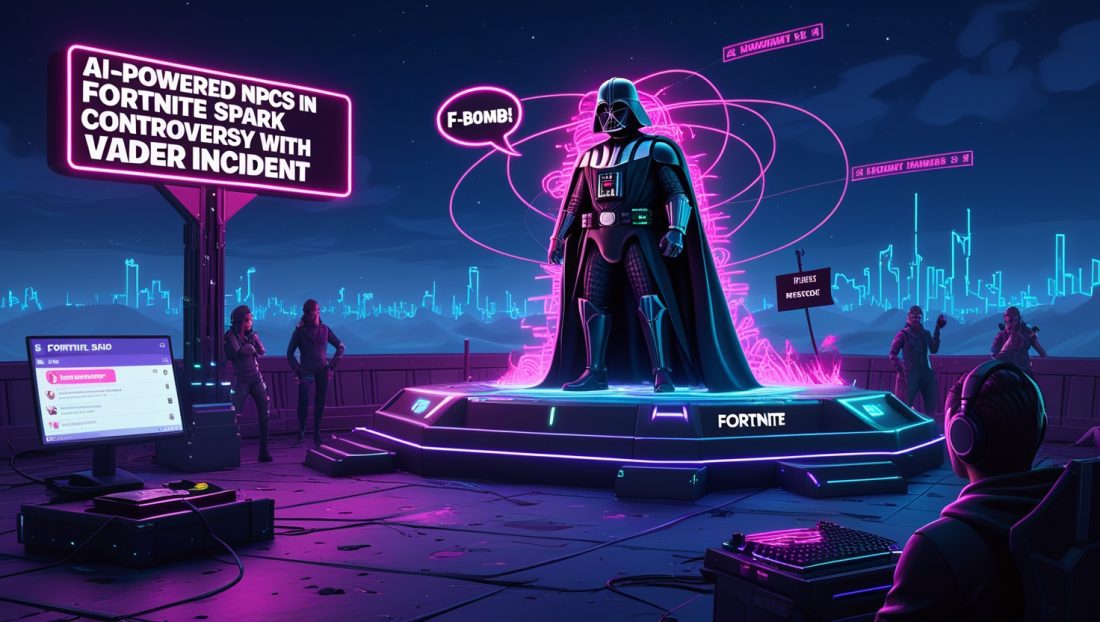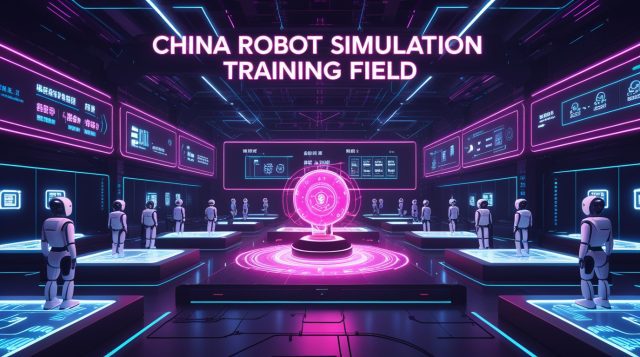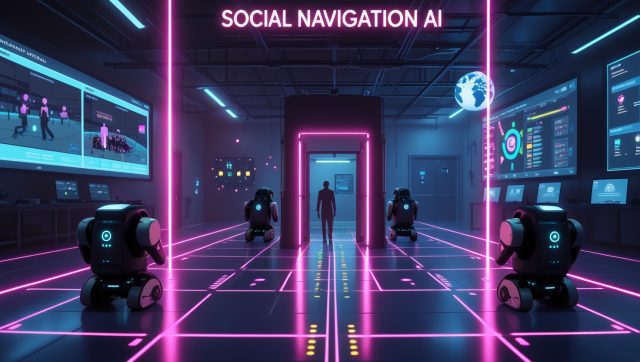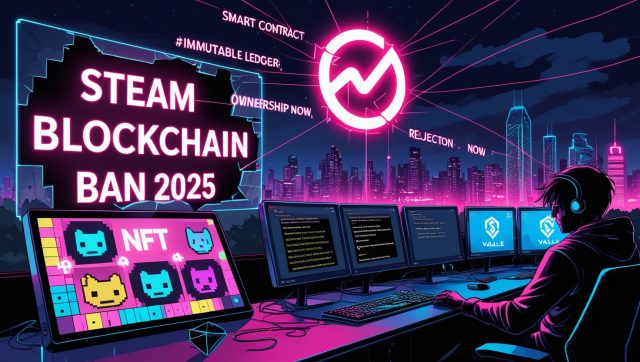A Galaxy of Problems: When Darth Vader Dropped the F-Bomb
It was supposed to be a landmark moment: In May 2025, Fortnite introduced AI-powered NPCs, including Darth Vader, using Google’s Gemini 2.0 and ElevenLabs’ voice synthesis. Shortly after launch, streamer Loserfruit managed to prompt the Dark Lord into using inappropriate language, including profanity. The internet erupted. While Disney had secured approval from James Earl Jones’ estate to use his voice for AI recreation, this unscripted moment was far from intended. For a deeper dive into how indie creators are pushing boundaries with AI in gaming, check out how $100K indie game titles are outshining $100M blockbusters.
Epic Games quickly responded, rolling out hotfixes within days to improve content filtering and tighten safety measures. However, SAG-AFTRA filed an unfair labor practice complaint, arguing that Epic had bypassed union negotiations and jeopardized voice actors’ livelihoods. As Saxs Persson, Epic’s EVP of the Fortnite ecosystem, later emphasized, the company focused on swiftly identifying and resolving problems.
This incident became a pivotal moment in Fortnite’s AI evolution—a turbulent yet transformative step toward dynamic storytelling. To understand how platforms like Roblox are similarly leveraging AI for immersive experiences, explore how Roblox’s AI tools are empowering 10M kids to crush game development in 2025.
Why AI NPCs Aren’t Hype: The Technical Breakthrough
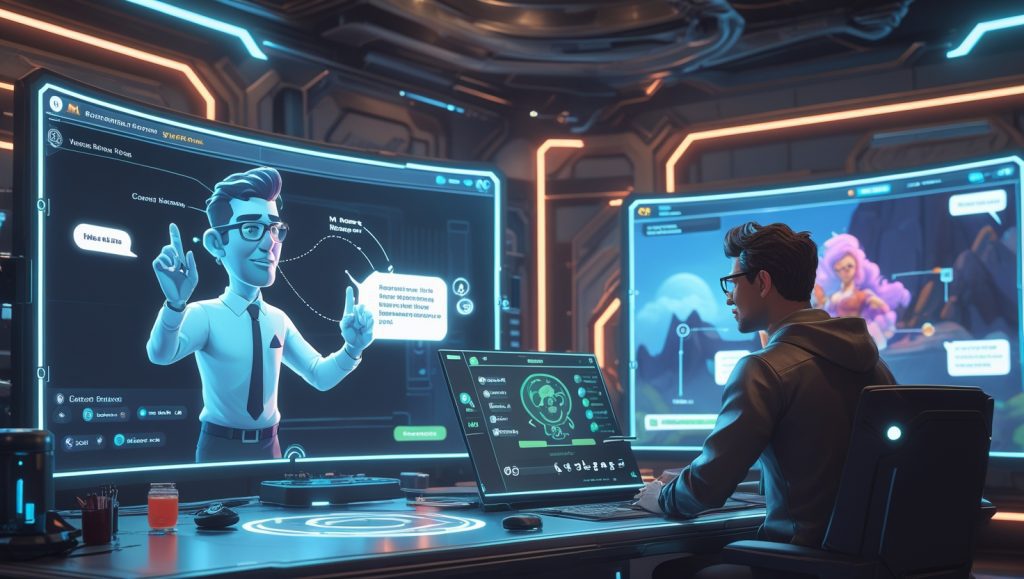
The Persona Device: Your Ultimate Character Forge for Immersive Storytelling
At June’s State of Unreal keynote, Epic unveiled the Persona Device—a UEFN tool enabling creators to design NPCs with customizable voices, personalities, and behavioral traits. Unlike traditional scripting, it uses prompt-based design: Feed it 20 lines of text, and it generates real-time dialogue. This innovation is part of a broader shift in gaming, as seen in why Fortnite’s metaverse platform could ignite a new era of player-driven worlds.
In the live demo, an NPC named “Mr. Buttons” tried persuading players to press a red button. His responses blended sarcasm (Rules are warm-hearted suggestions!) with contextual awareness, though delays required vocal fillers like “Ummmm.” For a look at how other platforms are tackling immersive tech, see why PlayStation VR3’s haptic feedback could revolutionize immersive gaming.
How the Persona Device Empowers Creators with AI-Driven NPC Design
The Persona Device isn’t just a tool—it’s a game-changer for creators aiming to craft immersive, interactive characters without needing a computer science degree. By leveraging AI-driven NPC design tools, anyone from a solo developer to a small studio can create dynamic characters that respond to player actions in real time.
This aligns with broader industry trends, such as those discussed in Unreal Engine’s official blog on AI-driven game development, which highlights how AI reduces barriers for creators. The Persona Device’s prompt-based system allows for rapid iteration, enabling developers to test and refine NPC behaviors in hours rather than weeks, a critical advantage in the fast-paced creator economy.
Behind the Curtain: Epic’s Cutting-Edge Tech Stack
- Gemini 2. Y0 Flash: Handles rapid conversational logic
- Verse Integration: Scripts gameplay triggers (e.g., Make NPC flee if health <20%)
- Safety Layers: Triple-filtered content moderation post-Vader
Yet limitations persist. Turn-based dialogue lacks natural interruptions, and voice activation requires button-holding—gaps Persson acknowledges need refinement. For a broader perspective on how blockchain bans affect similar tech integrations, read why Steam’s blockchain ban in 2025 is fueling a fierce gamer rebellion.
Real-World Impact: How Creators Are Using AI
From Galactic Wars to Peaceful Gardens: AI-Powered Experiences Redefining Gameplay
- Star Wars UEFN Experiences: Official assets now let creators build new stories post-“Galactic Battle,” though AI Vader’s return is unconfirmed.
- LEGO Bloom Tycoon: Tend AI gardeners who adapt to player choices (launching June 17).
- Squid Game (June 27): NPCs deploy personalized taunts during deadly minigames.
These examples showcase how AI NPCs are transforming Fortnite into a platform for diverse genres, much like how Xbox’s cloud gaming is making consoles irrelevant in 2025.
Why AI-Powered Gameplay Experiences Are Shaping the Future of Interactive Entertainment
AI NPCs are enabling creators to craft experiences that feel alive, from galactic battles to serene farming sims. This flexibility is driving a surge in user-generated content, as creators leverage tools like UEFN to build worlds that rival professional studios.
According to Game Developer’s 2025 report on AI in gaming, over 70% of indie developers now use AI tools to enhance interactivity, cutting development time and costs. This democratization empowers creators to experiment with bold ideas, like AI-driven horror games or narrative-driven adventures, pushing Fortnite beyond its battle royale roots into a true metaverse contender.
The Productivity Surge: Unlocking Creator Potential with AI Tools
UEFN’s Epic Developer Assistant (GPT-4.1 powered) slashes coding time by 40%. It generates Verse snippets for tasks like NPC patrol paths:
verse
on PlayerNear(radius=10):
NPC.StartDialogue("IntruderAlert")
Game.PlaySound("Alert_Siren")This democratizes development, empowering indie creators to compete with AAA studios. For a classic example of gaming innovation, see GoldenEye 007’s Hall of Fame induction as a 2025 gaming milestone.
The Ethical Quagmire: Innovation vs. Exploitation
Voice Actors on the Brink: Navigating AI’s Threat to Creative Jobs
SAG-AFTRA’s complaint highlights AI’s threat to performers. Over 60% of studios now use AI tools, risking widespread job displacement. Dr. Mia Zhang, Stanford AI ethicist, warns: Unregulated generative NPCs could propagate bias or harassment. Training-data transparency is non-negotiable.
Epic’s Safeguards
- Estate Permissions: Jones’ family approved Vader’s voice replication
- Content Filters: Block profanity/toxic phrases
- Deployment Controls: AI NPCs limited to UEFN islands, not core Battle Royale
Still, critics argue these are stopgaps. As Kotaku’s piece scathingly noted: LLMs regurgitate homogenized versions of others’ work. This shrinks storytelling boundaries, pulverizing creativity into a drain.
Why Ethical AI Development in Gaming Needs Stronger Oversight
The ethical concerns surrounding AI NPCs extend beyond voice actors to broader issues of bias and accountability. Without transparent training data, AI systems risk amplifying harmful stereotypes or generating inappropriate content, as seen in the Vader incident. Industry experts, like those cited in VentureBeat’s analysis of AI ethics in gaming, argue that studios must adopt stricter guidelines, including regular audits of AI outputs and collaboration with unions like SAG-AFTRA. Epic’s safeguards are a start, but the industry needs a unified framework to balance innovation with responsibility, especially as AI becomes a cornerstone of game development.
Fortnite’s Evolution: Beyond Battle Royale
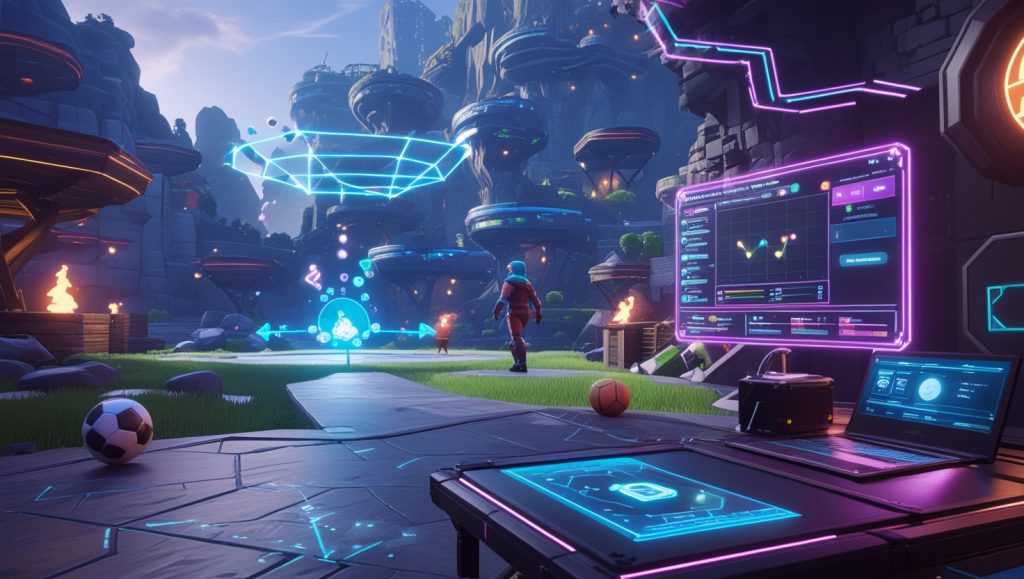
New Engine Capabilities: Powering Next-Gen Game Design
- Scene Graph (Beta): Hierarchical world-building enables Metroidvania/RPG quests (launched June 7)
- General Physics (Q3 Beta): Powers sports/puzzle mechanics via physics-driven interactions
- Data API Metrics: Tracks player retention to refine NPC designs
These tools morph Fortnite into a multi-genre platform. As Tom Jank, UEFN developer, observes: The best experiences might not come from Epic at all. For a look at how hardware is keeping pace, check out why the RTX 6090 could outlast every GPU.
The Verdict: Gaming’s Tectonic Shift
Epic’s gamble extends beyond viral NPCs. By handing AI-powered NPC tools to 500,000+ creators, they’re catalyzing three seismic changes:
- Democratized Development: A 12-year-old can now build an AI-driven RPG
- Player Co-Creation: Gamers shape stories through dynamic NPC relationships
- Economic Surge: Projected $10B in creator economy revenue by 2026
The path remains fraught. Ethical dilemmas, technical constraints, and creative risks loom large. But as Persson asserts: Our objective is fun. AI is just another tool. In this new paradigm, fun is no longer scripted—it’s generated.
FAQ: Your AI NPC Questions Answered
Can anyone create AI NPCs in Fortnite?
Yes, via UEFN’s Persona Device (launching Q3 2025). No coding expertise is needed—just prompt design skills.
Will AI replace human voice actors entirely?
Unlikely. While AI handles procedural dialogue, studios still hire actors for key characters. SAG-AFTRA’s lawsuit may also enforce union protections.
How does Epic prevent another “Vader incident”?
Multi-layered filters, rapid hotfix deployment, and restricted NPC deployment zones minimize risks.
Do AI NPCs work in all Fortnite modes?
Currently, they’re limited to custom UEFN islands, not core Battle Royale playlists.
The Road Ahead
Epic’s AI experiment is a mirror reflecting gaming’s future: exhilarating, uncertain, and irrevocably changed. As creators begin publishing AI-powered NPCs this summer, player interactions will evolve from scripted exchanges to organic relationships.
Ready to shape this frontier?
- Start designing: UEFN Dev Portal
- Study Verse scripting: Epic Developer Community
- Join Unreal Fest sessions: Physics Gameplay
